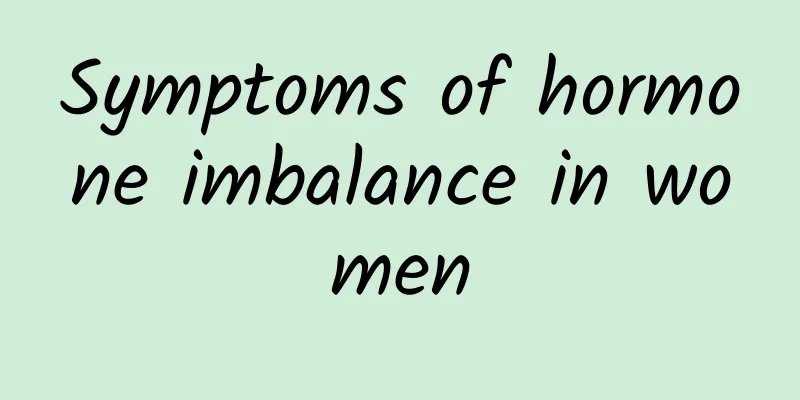Symptoms of hormone imbalance in women

|
If a woman's hormones are unbalanced, it often leads to a variety of symptoms, especially harmful to the reproductive system. It often causes irregular menstruation, irregular menstruation, excessive or insufficient secretion, insomnia, acne on the face, poor memory, gastrointestinal problems, mood swings, etc. Symptoms of hormone imbalance in women 1. Menstrual disorders Most women have a menstrual cycle of 21-35 days. If your period doesn't come at the same time every month, or if it doesn't come for several months, it may be related to too much or too little of a certain hormone (such as estrogen or progesterone). For people in their 40s or 50s, it may also be the result of premenopausal symptoms (premenopause). Additionally, irregular menstruation can be a symptom of health problems such as polycystic ovary syndrome. 2. Sleep problems If you don’t get enough shut-eye or your sleep quality is poor, it may be related to hormonal imbalance. Progesterone (or progesterone) released by the ovaries can help you sleep. If this hormone is below normal levels, it can make it difficult to fall asleep or stay asleep. Low estrogen levels can trigger hot flashes and night sweats, both of which can interfere with your ability to rest. 3. Chronic acne It is normal to get acne before and after your period. But acne or pimples are not necessarily a symptom of hormonal problems. Excessive secretion of androgens can cause the sebaceous glands to become overactive. Androgens also affect skin cells and nearby hair follicles. Both of these factors can cause your pores to become clogged and lead to acne. 4. Fuzzy memory Although it is not yet clear exactly how hormones affect the brain, it is known that changes in estrogen and progesterone can affect the brain and cause a person to feel "foggy" and have difficulty remembering things. Some experts believe that estrogen affects brain chemicals called neurotransmitters. Concentration and memory problems are most likely to occur before menopause and during menopause. But they can also be a symptom of a hormone-related condition, such as thyroid disease. 5. Gastrointestinal problems The intestines are lined with small cells called receptors that respond to the hormones estrogen and progesterone. When these hormones are above or below normal levels, you may notice changes in food digestion. This is also the reason why diarrhea, stomach pain, bloating and nausea may suddenly occur before, during and after your period. Therefore, when digestion is poor, it is likely related to hormonal imbalance. 6. Continuous fatigue Fatigue is one of the most common symptoms of hormonal imbalance. Too much progesterone can make you sleepy. In addition, if the thyroid gland secretes too little thyroid hormone, people may become listless. Blood tests can tell if thyroid levels are too low. 7. Mood swings and depression Researchers believe that decreased or rapidly changing hormone levels can lead to moodiness and depression. Estrogen affects brain chemicals such as serotonin, dopamine, and norepinephrine. As with other hormones, they use the same pathways as neurotransmitters and therefore also play a role in sensation. 8. Appetite and Weight Gain When you feel depressed or upset, it may be related to low estrogen levels, and you often want to eat. This is why decreased levels of this hormone are associated with weight gain. Too little estrogen can affect the body's leptin levels. 9. Headache Many things can trigger headaches. But for some women, low estrogen levels are the trigger. This is why you may feel headaches when estrogen levels drop around the time of your period. 10. Vaginal dryness Occasional vaginal dryness is normal. But if dryness or irritation is common, it may be related to low estrogen levels. This hormone helps keep the vagina moist and comfortable, so when estrogen is unbalanced and low, it can reduce vaginal fluid and cause tightening. 11. Loss of sexual desire Many people think of testosterone as a male hormone, but women also have this hormone. If your testosterone levels are lower than normal, your sex drive will decrease. 12. Breast changes Low estrogen levels can also reduce the firmness of breast tissue. This hormonal increase can thicken these tissues and even cause lumps or cysts. If you notice changes in your breasts and are unsure of the cause, it is best to consult a doctor. |
<<: What happens if sex hormones are low?
>>: What to do if a man has low sex hormones
Recommend
Blood spots on the skin
People's skin is relatively fragile, and many ...
Symptoms of liver fluke
Everyone must have heard the saying, "Diseas...
Can paper be digested?
Many children often swallow tissue paper into the...
How to do IVF best
In vitro fertilization is a method of artificial ...
How to stop itching when urticaria is very itchy? These methods are quick and effective
I believe many of my friends have heard of diseas...
What is spleen deficiency? Why is spleen deficiency more terrible than kidney deficiency?
The spleen is an important lymphatic organ with f...
The efficacy, function and consumption method of ginseng
The medicinal herb Codonopsis pilosula is quite c...
What medicine can cure thrush quickly?
Thrush is more common in infants and young childr...
The efficacy and function of Chinese medicine thistle
There are many kinds of Chinese medicinal materia...
Why is it difficult to get pregnant with cold body
For many girls, they have a cold constitution, wh...
Can retinal necrosis be cured?
Our eyes are not only the windows to our souls, b...
What does the kidney control in traditional Chinese medicine?
There are many different answers to the question ...
Benefits have arrived! Men can stretch this thing to nourish the kidneys
What are the methods of kidney tonification in tr...
Causes of low diastolic blood pressure in the elderly
Most middle-aged and elderly people have high blo...
What is Sodium Nitrite
Many of the clothes we wear and the foods we eat ...









